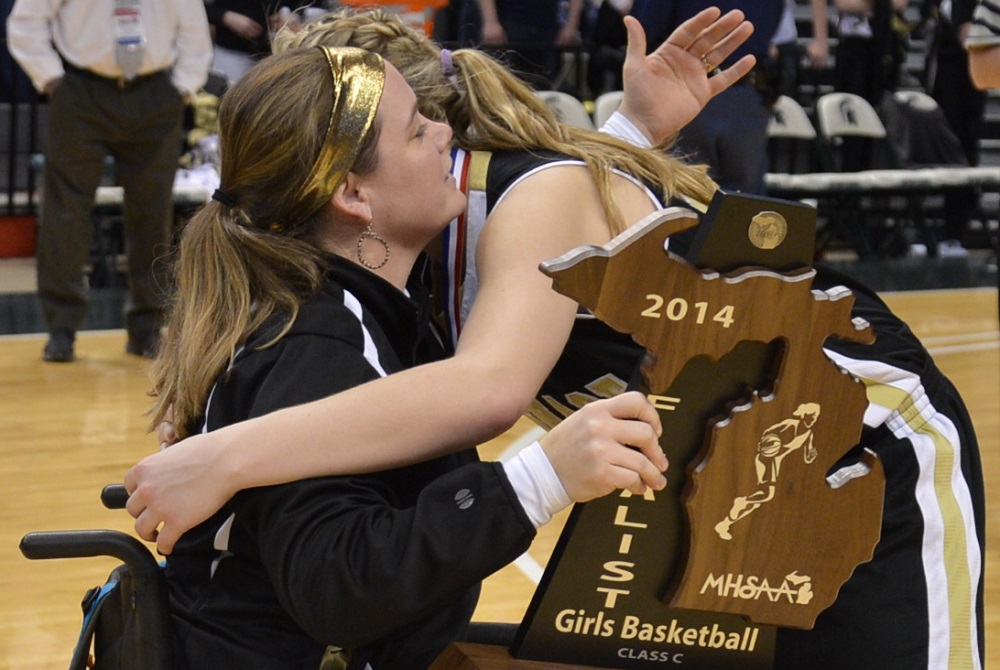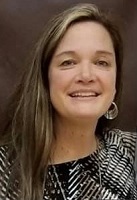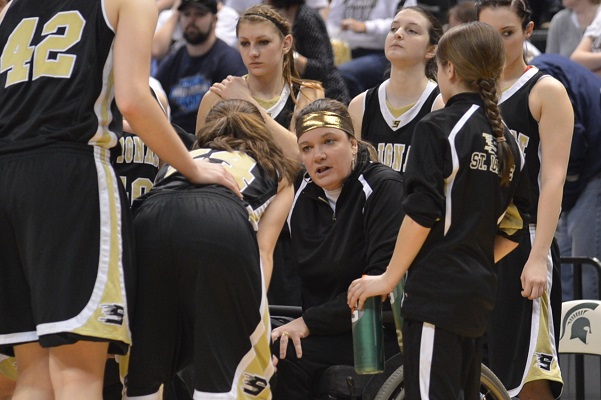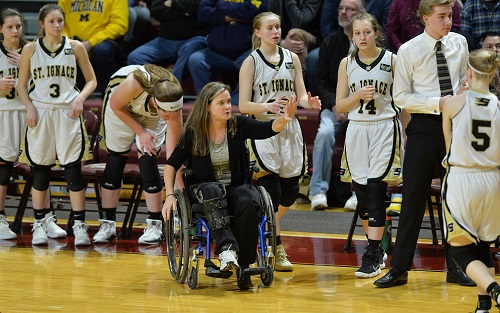
Changes Accompany Start of Fall Practice
August 8, 2019
By Geoff Kimmerly
Second Half editor
An assortment of game rules, preseason policy and postseason tournament changes will greet more than 100,000 high school student-athletes as 2019-20 Fall practices begin next week for nine sports for which the MHSAA sponsors postseason tournaments.
The most immediately noticeable adjustment will allow boys soccer, girls and boys cross country, boys tennis and girls golf teams to begin practice Monday, Aug. 12, along with football teams across the state.
Football practice traditionally begins before the rest of fall sports, by rule on the 16th Monday before Thanksgiving. However, a change approved by the MHSAA Representative Council will allow sports with MHSAA Finals tied to a specific weekend every fall – for example, Lower Peninsula Cross Country Finals always are the first weekend in November – the opportunity to begin practice on that 16th Monday as well, which will keep those teams from losing about a week of practice and competition during “late” Thanksgiving years when the holiday is during the fourth full week of November. Volleyball and Lower Peninsula girls swimming & diving – which, like football, have Finals tied to Thanksgiving – are not affected by the lateness of the holiday and will begin practice Wednesday, Aug. 14, keeping with their traditional starts.
Football teams must have 12 days of preseason practice at all levels before their first game, over a period of 16 calendar days before the first kickoff, with the first games this falls scheduled for the weekend of Aug. 29-31. Competition this fall may begin Aug. 16 for cross country, golf, soccer and tennis and Aug. 23 for volleyball and swimming & diving.
The most publicized change in MHSAA policy this fall likely will be the addition of limited seeding for Lower Peninsula Boys Soccer District play, using a Michigan Power Ratings (MPR) formula that debuted to assist in Boys Lacrosse Regional seeding this past spring and will be utilized as well for Districts in girls and boys basketball this winter and girls soccer beginning in 2020. The MPR formula ranks teams based on success and strength of schedule, with the top two teams in each District then placed on opposite sides of the bracket on the draw date for that sport. For boys soccer this fall, all games reported to the MHSAA through Sept. 28 will be used for MPR, with brackets announced Sept. 29. For more information on MPR and the boys soccer selection process, go to the MHSAA Website’s Boys Soccer page and see the information under “Tracking the Tournament."
Football remains the most played sport among MHSAA member school student-athletes and will introduce this season a series of in-game and practice-related changes. To improve pace of play, all varsity games will be played with a 40-second play clock that begins after the conclusion of the previous play except when there is an exception (penalty, timeout, etc.). In those circumstances, a 25-second clock will start with the referee’s ready-to-play whistle. Also beginning this football season, at the MHSAA Finals level, instant replay will be used to review all scoring plays and turnovers or potential scoring plays and turnovers (that is, when an official’s decision may have prevented or awarded a score or turnover). Replay review will be automatic in these situations.
The other notable rules changes in football continue a focus on safety. Tripping a ball carrier – that is, intentionally using the lower leg or foot to obstruct a runner below the knees – now will result in a 15-yard penalty. The definition of a horse-collar tackle also has been expanded to include grabbing of the name plate area on the back of the jersey (along with the inside of the neck area of the jersey or shoulder pads) to bring a runner to the ground. Horse-collar tackling also is penalized with a 15-yard personal foul.
Also beginning this season, the amount of practice “collision” contact will be defined in minutes instead of allowed days. Teams will be allowed no more than six hours of full-pads collision contact per week during the preseason and no more than 30 minutes of collision contact during a week of in-season (after games begin) practice. “Collision” is defined as contact at game speed, with the execution of full tackles at a competitive pace, taking players to the ground. Although “collision” contact will be limited, “thud” contact will be unlimited. “Thud” is not considered collision contact and defined as full speed but above the waist only, with no player taken to the ground and no winner or loser.
All fall sports face at least minor rules changes this season, and a few of the other most noticeable in-game adjustments will come in girls golf, volleyball, girls swimming & diving and boys soccer.
• In golf, athletes will be allowed to use cell phones in four situations – to call a coach or tournament administrator for a health and safety issue, for use in inputting scores for live scoring or other scoring applications, to contact a rules official with questions, and for use as a distance-measuring device.
• Also in golf, a new rule sets the maximum allowable score per hole at 12 strokes.
• In volleyball, attempted serves that make contact with a backboard or other support device hanging from the ceiling over the serving area now will be illegal serves instead of faults (which previously allowed the server another attempt). Also, when a ball in play strikes the cables or diagonal poles used to retract baskets or similar apparatus to the ceiling, the game official will stop play and determine if the ball was playable -- if it is ruled playable before making contact with the apparatus, there will be a replay; if the ball is deemed to have not been playable, it will be ruled out of bounds.
• Also in volleyball, a change regarding uniforms will make the libero more recognizable. A libero’s uniform top must clearly contrast with those of the rest of her teammates by using another predominant color. The libero’s uniform may be trimmed with the predominant color of her non-libero teammates’ uniforms, and vice versa. Also regarding volleyball uniforms, “00” may no longer be used as a jersey number, only numbers 0-99 to eliminate confusion.
• In swimming, the definition of a legal finish has changed to include a competitor touching any part of the finish end of the lane, not just the touch pad. In diving, the degree of difficulty was adjusted for back and reverse somersaults to provide consistency with difficulty of other dives.
• The game clock will stop in boys soccer beginning this fall when the team leading the game makes a substitution during the final five minutes of the second period of regulation or second part of overtime. This stoppage aims to prevent the team in the lead from using substitutions as a way to run time off the clock.
The 2019 Fall campaign culminates with postseason tournaments beginning with the Upper Peninsula Girls Tennis Finals during the first week of October and wraps up with the 11-Player Football Finals on Nov. 29 and 30. Here is a complete list of fall tournament dates:
Cross Country
U.P. Finals – Oct. 19
L.P. Regionals – Oct. 25 or 26
L.P. Finals – Nov. 2
11-Player Football
Selection Sunday – Oct. 27
Pre-Districts – Nov. 1 or 2
District Finals – Nov. 8 or 9
Regional Finals – Nov. 15 or 16
Semifinals – Nov. 23
Finals – Nov. 29-30
8-Player Football
Selection Sunday – Oct. 27
Regional Semifinals – Nov. 1 or 2
Regional Finals – Nov. 8 or 9
Semifinals – Nov. 16
Finals – Nov. 23
L.P. Girls Golf
Regionals – Oct. 7, 8, 9, 10, 11 or 12
Finals – Oct. 18-19
Soccer
Boys L.P. Districts – Oct. 9-11 & 14-19
Boys L.P. Regionals – Oct. 22-26
Boys L.P. Semifinals – Oct. 30
Boys L.P. Finals – Nov. 2
L.P. Girls Swimming & Diving
Diving Regionals – Nov.14
Swimming/Diving Finals – Nov. 22-23
Tennis
U.P. Girls Finals – Oct. 2, 3, 4 or 5
L.P. Boys Regionals – Oct. 10, 11 or 12
L.P. Finals – Oct. 18-19
Girls Volleyball
Districts – Nov. 4-9
Regionals – Nov. 12 &14
Quarterfinals – Nov. 19
Semifinals – Nov. 21-22
Finals – Nov. 23
The MHSAA is a private, not-for-profit corporation of voluntary membership by more than 1,500 public and private senior high schools and junior high/middle schools which exists to develop common rules for athletic eligibility and competition. No government funds or tax dollars support the MHSAA, which was the first such association nationally to not accept membership dues or tournament entry fees from schools. Member schools which enforce these rules are permitted to participate in MHSAA tournaments, which attract more than 1.4 million spectators each year.

Championship Team Builder Ingalls Named WISL Honoree
By
Geoff Kimmerly
MHSAA.com senior editor
March 22, 2021
Krista Clement played for high-caliber basketball programs at St. Ignace High School and University of Michigan. Then, after a few years of teaching, she decided to start her own team.
In 2013, Clement founded Helper Helper – a digital platform that provides tracking and coordination for community service efforts across the country and counts the NCAA among partners.
At first, Clement’s team was a team of one – herself. But as she started to build the company, her thoughts turned to her high school coach Dorene Ingalls – one of the most successful team builders in MHSAA history.
“Although we aren’t playing basketball on the Helper team, so much of what I do was through what I’ve learned from Dorene’s leadership,” Clement said. “My attempt to create a culture on my team – similar to a Saints basketball team – has come from Dorene. I now find myself trying to connect with my team the way Dorene connected with me – making my teammates feel valued and inspired to put their best foot forward every day.”
Over the last 22 years, Ingalls has built one of the most respected high school basketball programs in Michigan and become one of the most successful coaches in MHSAA history. She also has been one of the state’s most impactful advocates for girls basketball, and a presence in her adopted hometown that literally earned her the title of “ambassador” from the local chamber of commerce.
To celebrate her many and continuing contributions, Ingalls has been named the 34th recipient of the MHSAA Women In Sports Leadership Award, presented annually by the MHSAA’s Representative Council to “women coaches, officials and athletic administrators affiliated with the MHSAA who show exemplary leadership capabilities and positive contributions to athletics.”
And as with Clement, those contributions continue impacting many long after graduation.
“To have the confidence to overcome when people say you can’t do something,” Ingalls said, boiling down what she’s hoped to pass on over two decades. “We still always are like the ‘Hoosiers’ coming down (to a state championship game) – we go with that flow a little bit. We’re not going under the radar too often, but usually we don’t have as many DI (college) people as the teams we play. We try to make sure (our athletes learn) that hard work, dedication, positive attitude and don’t ever give up, fight through your adversities and just keep going, keep going, keep going.
 “I get letters from kids that went to boot camp that said, ‘Oh my gosh, the only way I survived this is because of our practices and our tryouts. All these other kids are stopping, and I keep going.’ … Other ones go on to be doctors and nurses in the field. That’s what it’s all about, when kids are fighting through stuff. If they have all-nighters, they can figure that out and they know they have that inner strength they haven’t tapped into yet, that willingness to keep going. I think that’s what high school sports are about – teaching them the skills they need in life, to fight through things, that you’re capable of more, you just have to sometimes dig deep, shake it off and step it on up. … It’s just kind of a thing that sticks with some of these kids, and when you see them or get invited to weddings or whatever, it has nothing to do with records or scoreboards. It’s continuing in their life, watching them have families and successes in careers – that’s when it’s fun.”
“I get letters from kids that went to boot camp that said, ‘Oh my gosh, the only way I survived this is because of our practices and our tryouts. All these other kids are stopping, and I keep going.’ … Other ones go on to be doctors and nurses in the field. That’s what it’s all about, when kids are fighting through stuff. If they have all-nighters, they can figure that out and they know they have that inner strength they haven’t tapped into yet, that willingness to keep going. I think that’s what high school sports are about – teaching them the skills they need in life, to fight through things, that you’re capable of more, you just have to sometimes dig deep, shake it off and step it on up. … It’s just kind of a thing that sticks with some of these kids, and when you see them or get invited to weddings or whatever, it has nothing to do with records or scoreboards. It’s continuing in their life, watching them have families and successes in careers – that’s when it’s fun.”
Ingalls has provided two decades of experiences on and off the court her Saints will never forget.
Through the end of this regular season, she has led the St. Ignace girls basketball varsity to a 464-80 record since taking over the program prior to the 1999 season. Her wins are the 18th-most among girls basketball coaches in MHSAA history, and she has led teams to five Finals championships and four runner-up finishes – or a championship game berth to conclude nearly half of those seasons as head coach. Her teams have reached at least the MHSAA Semifinals 11 times, and won 16 conference, 18 District and 14 Regional championships.
Ingalls also has served 20 years as a board member for the Basketball Coaches Association of Michigan (BCAM), including a three-year term as part of the executive board serving as president-elect, president and past president, and she continues to serve as chairperson of the Miss Basketball Award committee. She also has served on the MHSAA Basketball Committee.
“Dorene is someone who has been passionate for years about providing opportunities for young women,” MHSAA Executive Director Mark Uyl said. “That's easily seen in the work she's put in not just with her program but as a strong voice of leadership for the Basketball Coaches Association of Michigan. She's been one of the strongest advocates for girls basketball in our state over the last 20 years.”
There’s some necessary context behind all of those on-court win-loss numbers. St. Ignace has only about 200 students and generally plays in Division 3 (or formerly Class C) or Division 4 – yet during the regular season the Saints frequently line up games against much larger opponents from all over the state. They’ve had their share of stars, especially for such a small schools, but the success is also a testament to how Ingalls works to find specific roles for as many players as possible – whether it’s for a minute here or there to grab a rebound or get a steal, many play at least some little part in keeping the team moving forward.
And the memories made off the court have meant just as much, if not more.
Clement, who became the Upper Peninsula’s first Miss Basketball Award winner in 2003 and then a four-year captain at U-M, recalled how much she and her teammates laughed with their coach and how Ingalls has a talent for connecting with her players.
“Her record by itself could garner consideration for this award, but that is not the primary reason I write this letter,” wrote St. Ignace superintendent Don Gustafson in nominating Ingalls for the WISL Award. His daughter Linnie played for Ingalls four seasons before graduating in 2018.
“She teaches basketball, but she teaches much more than basketball. The characteristics that Dorene models for the athletes who have played under her tutelage are dedication, perseverance, teamwork and life lessons, to name a few. The players she has coached in the past stay connected with Dorene long after that graduate, as (she) continues to provide guidance and advice even after the student athlete’s playing days have concluded.”
Like many families, cancer has impacted the Ingalls – both she and her husband Doug lost their mothers to the disease when those women were only in their 50s. St. Ignace’s trips to East Lansing, or Grand Rapids to play at Calvin College, or last year to Detroit to play in the Motor City Roundball Classic, included trips to medical facilities.
 At the cancer center in East Lansing, the Saints inadvertently crossed paths with a St. Ignace resident undergoing treatment, and Dorene still is brought to tears retelling how they connected with that patient and were able to give her tickets to come watch them play that weekend. The Grand Rapids center was where Ingalls went through rehabilitation after suffering paralysis during childbirth in 2005; she remains partially paralyzed and uses a wheelchair.
At the cancer center in East Lansing, the Saints inadvertently crossed paths with a St. Ignace resident undergoing treatment, and Dorene still is brought to tears retelling how they connected with that patient and were able to give her tickets to come watch them play that weekend. The Grand Rapids center was where Ingalls went through rehabilitation after suffering paralysis during childbirth in 2005; she remains partially paralyzed and uses a wheelchair.
Last season, before COVID-19 grounded the Saints’ chances to win another title, the team visited Karmanos Cancer Center in Detroit, including the room where one of the player’s mothers had fought for her life just a year before. That mother was part of the visit and, as Ingalls recalled, “to have that, and not the state championship, that’s probably more important. … That was pretty special. They’re learning the lessons that you’re hoping they do.”
This season’s team hasn’t enjoyed the “changing life” speeches that are part of usual bus trips, because right now the Saints aren’t taking buses to away games. But the pandemic has provided other opportunities – like when the team did workouts in the snow before full-contact practice was allowed to resume, or spent one practice performing skits for each other from the 1970s and 80s just to “break up the uncertainty and negativity.” Ingalls called it making the most of what you’ve got – and those are the memories she knows won’t be forgotten.
There has been recognition. She was inducted into the Upper Peninsula Sports Hall of Fame in 2016 and received the Michigan Sports Hall of Fame’s Treasure Award in 2017 – in addition to various Coach of the Year awards both for the Upper Peninsula and statewide over the years. She was named the Prep Person of the Year by the Detroit Free Press in 2011 and received BCAM's Tom Hursey Distinguished Service Award in 2018.
All are proud moments. But perhaps the proudest is another effort that keeps on building. Mining a connection to Lowell High School and its Pink Arrow cancer awareness games – St. Ignace alum Nate Fowler is Lowell’s superintendent – Ingalls hatched the annual Hooping for a Cure basketball game in 2009. Cedarville, Cheboygan and Mackinaw City have joined in the fundraising game since, and the event became a doubleheader this season with the girls and boys teams both playing.
The event raised a record $35,000+ in 2020, and more than $25,000 this season despite attendance restrictions. That brought the total to more than $245,000 – funds that at first were donated to the oncology department at Mackinac Straits Hospital in part for the purchase of specialized examining tables and chemotherapy treatment infusion recliners. Once the equipment needs were met and a new hospital – Mackinac Straits Health System – was built, the money went into a No Cancer Patient Left Behind fund that provides financial support for patients who have to travel outside of the area for further treatment.
 “This benefit game and ensuing experiences for the team have taught us about being grateful for every day we do have and to have the courage to fight through adversity,” Ingalls said. “These vital lessons will carry on in all of us for a lifetime.
“This benefit game and ensuing experiences for the team have taught us about being grateful for every day we do have and to have the courage to fight through adversity,” Ingalls said. “These vital lessons will carry on in all of us for a lifetime.
“In fact I recently received a photo from a former player sitting in one of the infusion chairs getting treatment for an autoimmune disease that really struck me deeply. Talk about full circle.”
Ingalls is a 1986 graduate of New Baltimore Anchor Bay High School, where she played basketball, volleyball and softball. She attended Lake Superior State University, earning a bachelor’s degree in geology in 1991, and she then moved to St. Ignace to begin six years as a geologist before starting a screen printing and embroidery business.
She had earned 10 letters playing four sports at LSSU – volleyball, basketball, softball and tennis – and soon after moving to St. Ignace she joined the Saints’ coaching ranks, first as a junior high and assistant junior varsity basketball coach in 1992-93, then junior varsity girls head coach from 1994-98 until she took over the varsity position. She also has coached softball and subvarsity boys basketball.
Ingalls and husband Doug have two sons, Jackson and Jonathan.
The first Women In Sports Leadership Award was presented in 1990.
Past recipients
1990 – Carol Seavoy, L’Anse
1991 – Diane Laffey, Harper Woods
1992 – Patricia Ashby, Scotts
1993 – Jo Lake, Grosse Pointe
1994 – Brenda Gatlin, Detroit
1995 – Jane Bennett, Ann Arbor
1996 – Cheryl Amos-Helmicki, Huntington Woods
1997 – Delores L. Elswick, Detroit
1998 – Karen S. Leinaar, Delton
1999 – Kathy McGee, Flint
2000 – Pat Richardson, Grass Lake
2001 – Suzanne Martin, East Lansing
2002 – Susan Barthold, Kentwood
2003 – Nancy Clark, Flint
2004 – Kathy Vruggink Westdorp, Grand Rapids
2005 – Barbara Redding, Capac
2006 – Melanie Miller, Lansing
2007 – Jan Sander, Warren Woods
2008 – Jane Bos, Grand Rapids
2009 – Gail Ganakas, Flint; Deb VanKuiken, Holly
2010 – Gina Mazzolini, Lansing
2011 – Ellen Pugh, West Branch; Patti Tibaldi, Traverse City
2012 – Janet Gillette, Comstock Park
2013 – Barbara Beckett, Traverse City
2014 – Teri Reyburn, DeWitt
2015 – Jean LaClair, Bronson
2016 – Betty Wroubel, Pontiac
2017 – Dottie Davis, Ann Arbor
2018 – Meg Seng, Ann Arbor
2019 – Kris Isom, Adrian
2020 – Nikki Norris, East Lansing
PHOTOS: (Top) St. Ignace girls basketball coach Dorene Ingalls embraces one of her players after their team finished Class C runner-up in 2014. (Middle) Ingalls talks things over with her team during a game at the Breslin Center. (Below) Ingalls coaches her team during a Semifinal win at Calvin College's Van Noord Arena in 2019.

